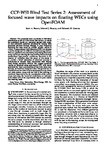CCP-WSI Blind Test Series 2: Assessment of focused wave impacts on floating WECs using OpenFOAM
| dc.contributor.author | Brown, Scott Andrew | |
| dc.contributor.author | Ransley, E | |
| dc.contributor.author | Greaves, Deborah | |
| dc.date.accessioned | 2019-09-06T12:00:47Z | |
| dc.date.issued | 2019-09-03 | |
| dc.identifier.uri | http://hdl.handle.net/10026.1/14882 | |
| dc.description.abstract |
The presented work represents an individual contribution to the CCP-WSI Blind Test Series 2, in which the submitted results are compared against both physical and alternative numerical solutions for varying wave steepness achieved through changes in peak frequency. Reducing the time taken to provide reliable results is critical if computational fluid dynamics (CFD) is to become a routine design tool for offshore renewable energy devices. This can potentially be achieved by simplifying simulation setup, and hence reducing the required man-hours, through standardised `best practice' procedures. Therefore, in the absence of validation data, the scope of this study is to provide a `blind' estimation of numerical accuracy in simulations of focused wave interactions with floating wave energy converters (WECs). The present numerical results are obtained using open-source CFD with waves generated via linear superposition of first order wave components, derived from empty tank data. Two geometries are considered and the effect of wave steepness on surge, heave and pitch motion, along with the load in the mooring, is examined. Based solely on the reproduction of the known empty tank data, the numerical predictions are estimated to be within 10% of the experimental data in peak motion and mooring loads. | |
| dc.language.iso | en | |
| dc.subject | Error Estimation | |
| dc.subject | Wave Energy | |
| dc.subject | CFD | |
| dc.subject | Extreme Events | |
| dc.subject | NewWave | |
| dc.subject | Uncertainty | |
| dc.title | CCP-WSI Blind Test Series 2: Assessment of focused wave impacts on floating WECs using OpenFOAM | |
| dc.type | conference | |
| plymouth.date-start | 2019-09-02 | |
| plymouth.date-finish | 2019-09-06 | |
| plymouth.conference-name | 13th European Wave and Tidal Energy Conference (EWTEC) | |
| plymouth.organisational-group | /Plymouth | |
| plymouth.organisational-group | /Plymouth/Faculty of Science and Engineering | |
| plymouth.organisational-group | /Plymouth/Faculty of Science and Engineering/School of Engineering, Computing and Mathematics | |
| plymouth.organisational-group | /Plymouth/PRIMaRE Publications | |
| plymouth.organisational-group | /Plymouth/REF 2021 Researchers by UoA | |
| plymouth.organisational-group | /Plymouth/REF 2021 Researchers by UoA/UoA12 Engineering | |
| plymouth.organisational-group | /Plymouth/Research Groups | |
| plymouth.organisational-group | /Plymouth/Research Groups/Marine Institute | |
| plymouth.organisational-group | /Plymouth/Users by role | |
| plymouth.organisational-group | /Plymouth/Users by role/Academics | |
| plymouth.organisational-group | /Plymouth/Users by role/Researchers in ResearchFish submission | |
| dcterms.dateAccepted | 2019-06-14 | |
| dc.rights.embargodate | 2019-9-10 | |
| dc.rights.embargoperiod | Not known | |
| rioxxterms.version | Accepted Manuscript | |
| rioxxterms.licenseref.uri | http://www.rioxx.net/licenses/all-rights-reserved | |
| rioxxterms.licenseref.startdate | 2019-09-03 | |
| rioxxterms.type | Conference Paper/Proceeding/Abstract |


